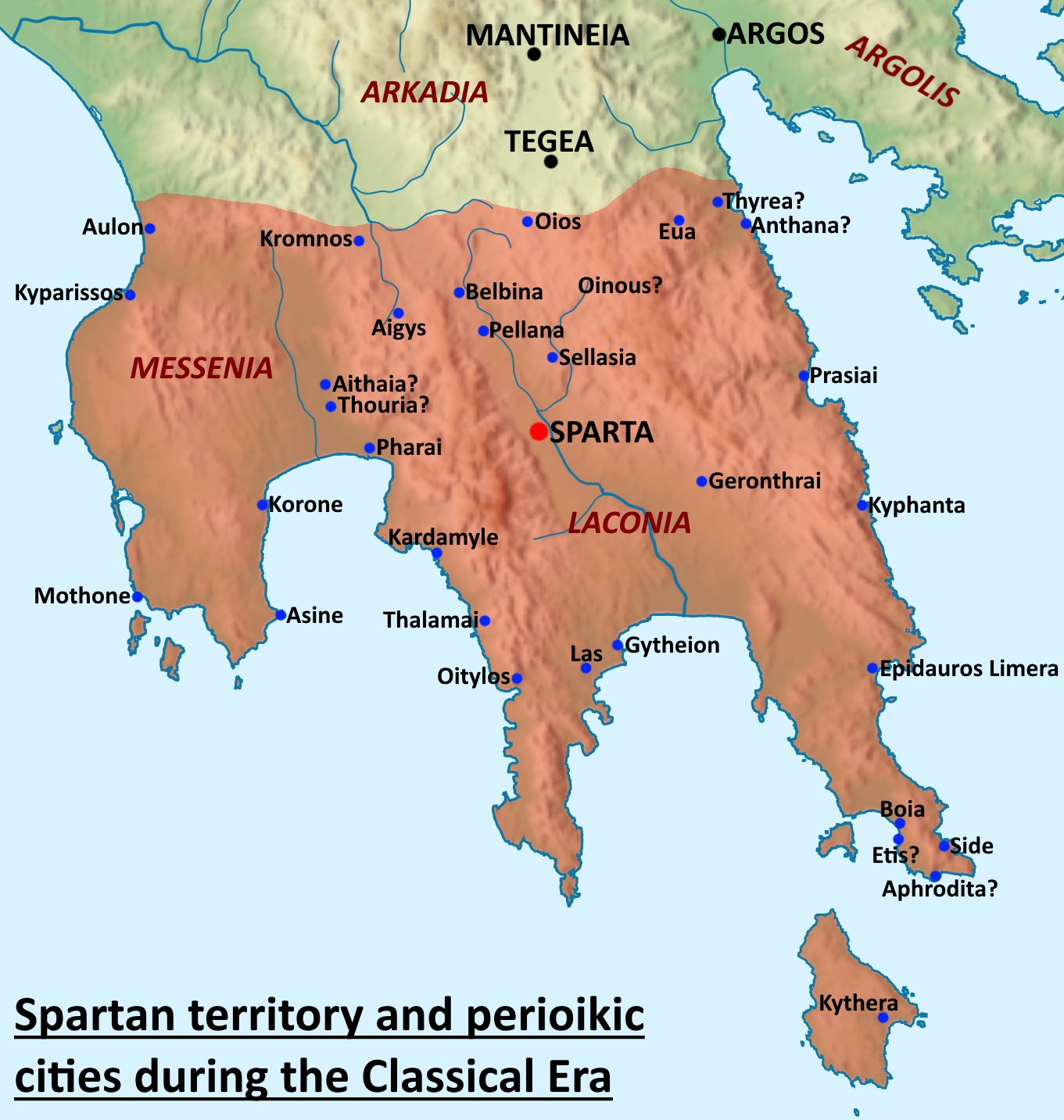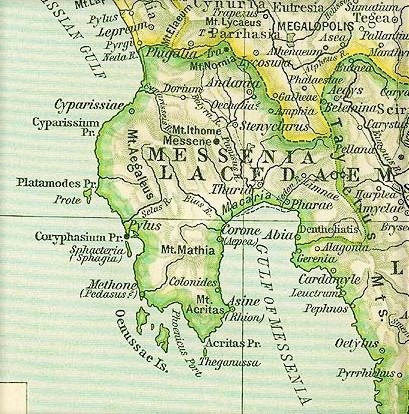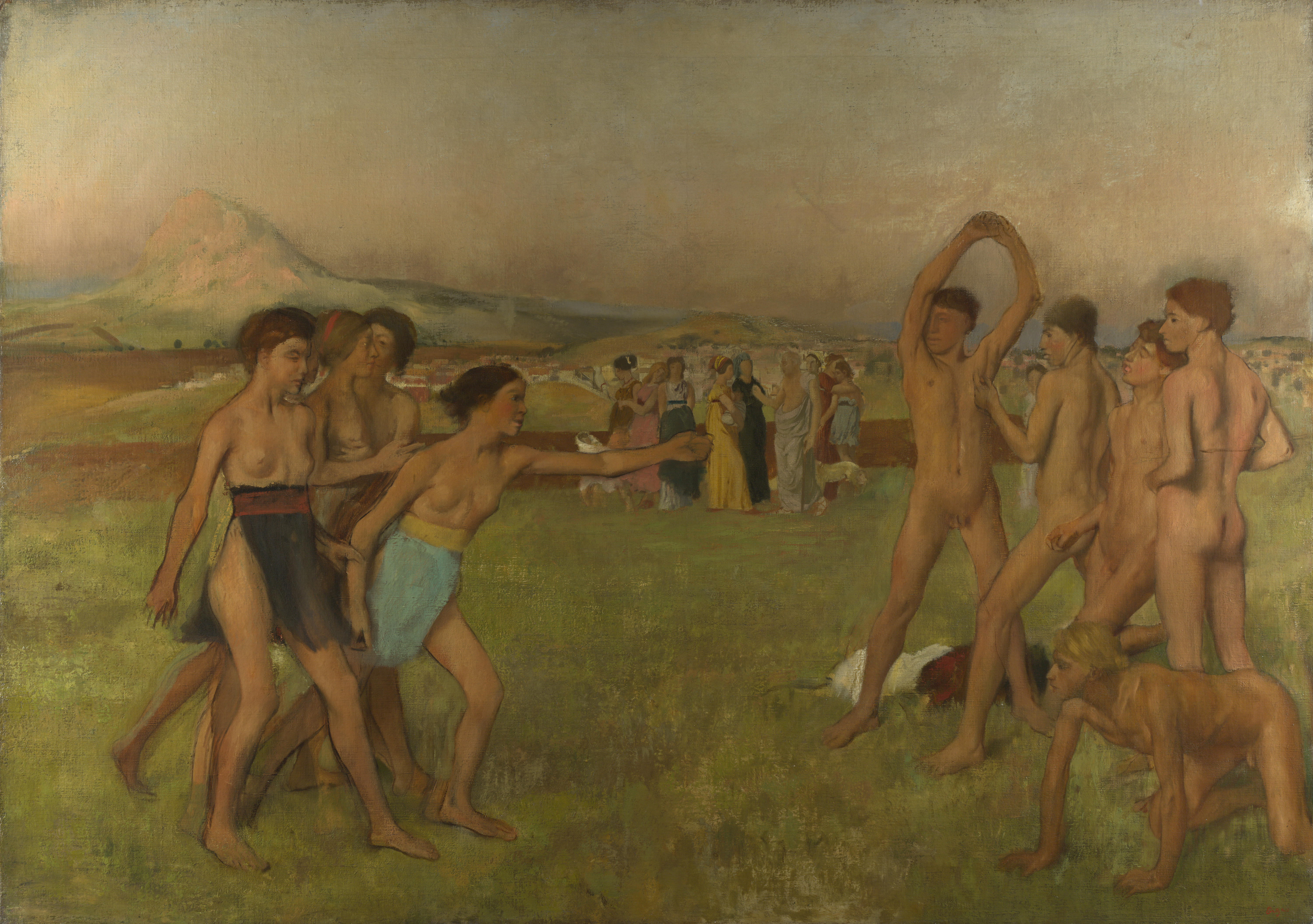 |
Spartiate
A Spartiate (cf. its plural Spartiatae 'Spartans') �spärshēˈātē(z)or Spartiate �spärshēˌāt(from respectively the Latin and French forms corresponding to Classical- el, and pl. Σπᾰρτῐᾱ́ται) or ''Homoios'' (pl. ''Homoioi'' from respectively Classical- el, and Ὅμοιοι "those who are alike") was an elite full-citizen male of Sparta. Full citizen Spartiates were barred by law from work, and were supported by the other social classes of Spartan society. From a young age, male Spartiates were trained for battle and put through grueling challenges intended to craft them into fearless warriors. In battle, they had the reputation of being the best soldiers in Greece, and the strength of Sparta's hoplite forces let the city become the dominant state in Greece throughout much of the Classical period. Other city-states were reluctant to attack Sparta, even though it could muster a force of only about 8000 Spartiates during the zenith of its dominanc ... [...More Info...] [...Related Items...] OR: [Wikipedia] [Google] [Baidu] |
 |
Sparta
Sparta (Doric Greek: Σπάρτα, ''Spártā''; Attic Greek: Σπάρτη, ''Spártē'') was a prominent city-state in Laconia, in ancient Greece. In antiquity, the city-state was known as Lacedaemon (, ), while the name Sparta referred to its main settlement on the banks of the Eurotas River in Laconia, in south-eastern Peloponnese. Around 650 BC, it rose to become the dominant military land-power in ancient Greece. Given its military pre-eminence, Sparta was recognized as the leading force of the unified Greek military during the Greco-Persian Wars, in rivalry with the rising naval power of Athens. Sparta was the principal enemy of Athens during the Peloponnesian War (431–404 BC), from which it emerged victorious after the Battle of Aegospotami. The decisive Battle of Leuctra in 371 BC ended the Spartan hegemony, although the city-state maintained its political independence until its forced integration into the Achaean League in 192 BC. The city neverthe ... [...More Info...] [...Related Items...] OR: [Wikipedia] [Google] [Baidu] |
 |
Spartan Constitution
The Spartan Constitution (or Spartan politeia) are the government and laws of the classical Greek city-state of Sparta. All classical Greek city-states had a politeia; the politeia of Sparta however, was noted by many classical authors for its unique features, which supported a rigidly layered social system and a strong hoplite army. The Spartans had no historical records, literature, or written laws, which were, according to tradition, prohibited. Attributed to the mythical figure of Lycurgus, the legendary law-giver, the Spartan system of government is known mostly from the ''Constitution of the Lacedaemonians'', a treatise attributed to the ancient Greek historian Xenophon, describing the institutions, customs, and practices of the ancient Spartans. The act of the foundation Great Rhetra According to Plutarch, Lycurgus (to whom is attributed the establishment of the severe reforms for which Sparta has become renowned, sometime in the 9th century BC) first sought c ... [...More Info...] [...Related Items...] OR: [Wikipedia] [Google] [Baidu] |
|
Helots
The helots (; el, εἵλωτες, ''heílotes'') were a subjugated population that constituted a majority of the population of Laconia and Messenia – the territories ruled by Sparta. There has been controversy since antiquity as to their exact characteristics, such as whether they constituted an Ancient Greek tribe, a social class, or both. For example, Critias described helots as " slaves to the utmost", whereas according to Pollux, they occupied a status "between free men and slaves". Tied to the land, they primarily worked in agriculture as a majority and economically supported the Spartan citizens. The number of helots in relation to Spartan citizens varied throughout the history of the Spartan state; according to Herodotus, there were seven helots for each Spartan at the time of the Battle of Plataea in 479 BC. Thus the need to keep the helot population in check and prevent rebellion was one of the main concerns of the Spartans. Helots were ritually mistreated an ... [...More Info...] [...Related Items...] OR: [Wikipedia] [Google] [Baidu] |
|
|
HMS Spartiate
HMS ''Spartiate'' has been the name of two ships of the Royal Navy. The first was a captured French prize, the second was mostly likely named after this ship. * was a 74-gun third-rate ship of the line. She was captured from the French at the Battle of the Nile and fought at the Battle of Trafalgar on the British side. * was a launched in 1898 and broken up in 1932. HMS ''Spartiate'' was also a former Royal Navy shore establishment in St Enoch's Hotel Glasgow Glasgow ( ; sco, Glesca or ; gd, Glaschu ) is the most populous city in Scotland and the fourth-most populous city in the United Kingdom, as well as being the 27th largest city by population in Europe. In 2020, it had an estimated pop ... Western Approaches Command, Clyde References * {{DEFAULTSORT:Spartiate, Hms Royal Navy ship names ... [...More Info...] [...Related Items...] OR: [Wikipedia] [Google] [Baidu] |
|
 |
Perioeci
The Perioeci or Perioikoi (, ) were the second-tier citizens of the ''polis'' of Sparta until 200 BC. They lived in several dozen cities within Spartan territories (mostly Laconia and Messenia), which were dependent on Sparta. The ''perioeci'' only had political rights in their own city, while the course of the Spartan state exclusively belonged to Spartan citizens, or Spartiates. The name ''perioeci'' roughly means "those dwelling around/nearby", deriving from , ''peri'', "around", and , ''oîkos'', "dwelling, house". ''Perioeci'' and Spartans were collectively called the '' Lakedaimonians''. They had a central role in the Spartan economy, controlling commerce and business, as well as being responsible for crafts and manufacturing, including producing the weapons and armour of the Spartan army, as the higher-ranking Spartan citizens considered all commercial and money-making activities to be unworthy of them. The ''perioeci'' were also the only people allowed to freely trav ... [...More Info...] [...Related Items...] OR: [Wikipedia] [Google] [Baidu] |
 |
First Messenian War
The First Messenian War was a war between Messenia and Sparta. It began in 743 BC and ended in 724 BC, according to the dates given by Pausanias. The war continued the rivalry between the Achaeans and the Dorians that had been initiated by the purported Return of the Heracleidae. Both sides utilized an explosive incident to settle the rivalry by full-scale war. The war was prolonged into 20 years. The result was a Spartan victory. Messenia was depopulated by emigration of the Achaeans to other states. Those who did not emigrate were reduced socially to helots, or serfs. Their descendants were held in hereditary servitude for centuries until the Spartan state finally needed them for defense. Dates Pausanias' standard dates Pausanias says that the opening campaign was a surprise attack on Ampheia by a Spartan force commanded by Alcmenes, Agiad king of Sparta, in the second year of the 9th Olympiad. The end of the war was the abandonment of Mt. Ithome in the first year of the 14 ... [...More Info...] [...Related Items...] OR: [Wikipedia] [Google] [Baidu] |
 |
Agoge
The ( grc-gre, ἀγωγή in Attic Greek, or , in Doric Greek) was the rigorous education and training program mandated for all male Spartan citizens, with the exception of the firstborn son in the ruling houses, Eurypontid and Agiad. The word had various meanings in Ancient Greek, and comes from the verb (to lead).. There is no evidence that it was used to refer to the Spartan education system until the 3rd century BC, but it was often used before then to mean training, guidance, or discipline. The education featured in the involved cultivating loyalty to Sparta through military training (e.g., pain tolerance), hunting, dancing, singing, and social (communicating) preparation. The was divided into three age groups, roughly corresponding to young children, adolescents, and young adults. Spartan girls did not participate in the , although they may have received a similar state-sponsored education. Sources are unclear about the exact origins of the . According to Xenop ... [...More Info...] [...Related Items...] OR: [Wikipedia] [Google] [Baidu] |
 |
Krypteia
The Crypteia, also referred to as Krypteia or Krupteia (Greek: κρυπτεία ''krupteía'' from κρυπτός ''kruptós'', "hidden, secret"), was an ancient Spartan state institution involving young Spartan men. It was an exclusive element of Sparta's state-sponsored child-rearing system in which participation afforded its members, known as ''kryptai'' (κρύπται, members of the Krypteia), the opportunity to test their skills further and to prove themselves worthy of the Spartan polity. As an organisation, the Crypteia's mandate and practices are still debated by historians. Overview The Crypteia had young Spartan men, probably between the ages of 21 and 30, who were described as "those judged to have the most intelligence." The men were known as ''hêbôntes'', one of the many social categories that preceded full Spartiate citizenship, and had completed their rearing at the agoge with such success that they were marked out as potential future leaders by Spartan offici ... [...More Info...] [...Related Items...] OR: [Wikipedia] [Google] [Baidu] |
|
Warrior
A warrior is a person specializing in combat or warfare, especially within the context of a tribal or clan-based warrior culture society that recognizes a separate warrior aristocracies, class, or caste. History Warriors seem to have been present in the earliest pre-state societies. Scholars have argued that horse-riding Yamnaya warriors from the Pontic–Caspian steppe played a key role during the Indo-European migrations and the diffusion of Indo-European languages across Eurasia. Most of the basic weapons used by warriors appeared before the rise of most hierarchical systems. Bows and arrows, clubs, spears, swords, and other edged weapons were in widespread use. However, with the new findings of metallurgy, the aforementioned weapons had grown in effectiveness. When the first hierarchical systems evolved 5000 years ago, the gap between the rulers and the ruled had increased. Making war to extend the outreach of their territories, rulers often forced men from lo ... [...More Info...] [...Related Items...] OR: [Wikipedia] [Google] [Baidu] |
|
|
Syssitia
The syssitia ( grc, συσσίτια ''syssítia'', plural of ''syssítion'') were, in ancient Greece, common meals for men and youths in social or religious groups, especially in Crete and Sparta, but also in Megara in the time of Theognis of Megara (sixth century BCE) and Corinth in the time of Periander (seventh century BCE). The banquets spoken of by Homer relate to the tradition. Some reference to similar meals can be found in Carthage and according to Aristotle (''Politics'' VII. 9), it prevailed still earlier amongst the Oenotrians of Calabria. The origin of the ''syssítia'' is attributed to Rhadamanthus, the legendary lawgiver of Knossos of Crete. This is explained by Cleinias of Crete in conversation with an Athenian and a Spartan, in Plato's dialogue the Laws. Lycurgus of Sparta certainly made use of the practice in Sparta. Sparta In Sparta, where the system was most evolved, they were also called ''pheiditia'' (, The term is probably a corruption of ''phil ... [...More Info...] [...Related Items...] OR: [Wikipedia] [Google] [Baidu] |
|
.jpg) |
Ephors
The ephors were a board of five magistrates in ancient Sparta. They had an extensive range of judicial, religious, legislative, and military powers, and could shape Sparta's home and foreign affairs. The word "''ephors''" (Ancient Greek ''éphoroi'', plural form of ''éphoros'') comes from the Ancient Greek ''epi'', "on" or "over", and ''horaō'', "to see", i.e., "one who oversees" or "overseer". The ephors were a council of five Spartan men elected annually who swore an oath monthly on the behalf of the state. The Spartan kings, however, would swear on behalf of themselves. The ephors did not have to kneel before the Kings of Sparta, and were held in high esteem by the citizens because of the importance of their powers and because of the holy role that they earned throughout their functions.Donald Kagan, ''The Outbreak of the Peloponnesian War''. page 29. Ithaca/New York 1969, . Several other Greek city-states with a Spartan ancestry also had ephors, such as Taras or Cyr ... [...More Info...] [...Related Items...] OR: [Wikipedia] [Google] [Baidu] |
.jpg) |
Elite
In political and sociological theory, the elite (french: élite, from la, eligere, to select or to sort out) are a small group of powerful people who hold a disproportionate amount of wealth, privilege, political power, or skill in a group. Defined by the '' Cambridge Dictionary'', the "elite" are "those people or organizations that are considered the best or most powerful compared to others of a similar type." American sociologist C. Wright Mills states that members of the elite accept their fellows' position of importance in society. "As a rule, 'they accept one another, understand one another, marry one another, tend to work, and to think, if not together at least alike'." It is a well-regulated existence where education plays a critical role. Universities in the US Youthful upper-class members attend prominent preparatory schools, which not only open doors to such elite universities as Harvard, Yale, Princeton, and the University of Pennsylvania, but also to the univ ... [...More Info...] [...Related Items...] OR: [Wikipedia] [Google] [Baidu] |